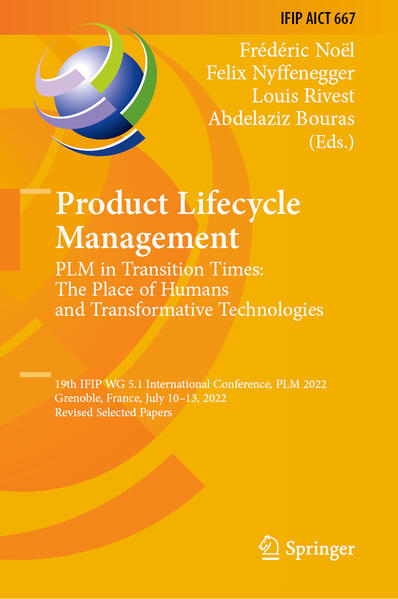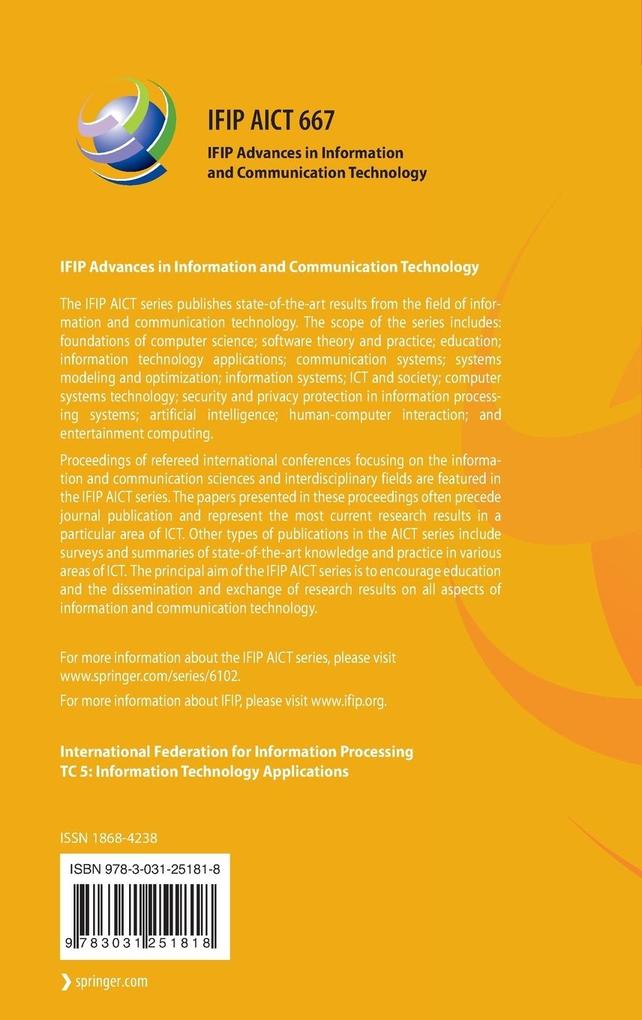
Zustellung: Sa, 05.07. - Mi, 09.07.
Versand in 7 Tagen
VersandkostenfreiBestellen & in Filiale abholen:
This book constitutes the refereed proceedings of the 19th IFIP WG 5. 1 International Conference, PLM 2022, Grenoble, France, July 10-13, 2022, Revised Selected Papers.
The 67 full papers included in this book were carefully reviewed and selected from 94 submissions. They were organized in topical sections as follows: Organisation: Knowledge Management, Business Models, Sustainability, End-to-End PLM, Modelling tools: Model-Based Systems Engineering, Geometric modelling, Maturity models, Digital Chain Process, Transversal Tools: Artificial Intelligence, Advanced Visualization and Interaction, Machine learning, Product development: Design Methods, Building Design, Smart Products, New Product Development, Manufacturing: Sustainable Manufacturing, Lean Manufacturing, Models for Manufacturing.
The 67 full papers included in this book were carefully reviewed and selected from 94 submissions. They were organized in topical sections as follows: Organisation: Knowledge Management, Business Models, Sustainability, End-to-End PLM, Modelling tools: Model-Based Systems Engineering, Geometric modelling, Maturity models, Digital Chain Process, Transversal Tools: Artificial Intelligence, Advanced Visualization and Interaction, Machine learning, Product development: Design Methods, Building Design, Smart Products, New Product Development, Manufacturing: Sustainable Manufacturing, Lean Manufacturing, Models for Manufacturing.
Inhaltsverzeichnis
Organisation: Knowledge Management, Business Models, Sustainability, End-to-End PLM. - POSEIDON: A Graphical Editor for Item Selection Rules Within Feature Combination Rule Contexts. - Software Parts Classification for Agile and Efficient Product Life Cycle Management. - General methodology for the generation and dissemination of manufacturing knowledge: a case study with the Double Diamond AM Knowledge Approach. - Fostering SMEs collaborations within a cluster. - Data analytics capability roadmap for PPO business models in equipment manufacturing companies. - Systematic literature review about Sustainable Business Models and Industry. - Pay-Per-X Business Models for Equipment Manufacturing Companies: A Maturity Model. - Supporting the development of circular value chains in the automotive sector through an information sharing system. - Requirements on and Selection of Data Storage Technologies for Life Cycle Assessment. - Digital Twin application to Energy Consumption Management in production: a literature review. - Product Lifecycle Management and Open Innovation in the Deep Tech Start-ups development. - Distributed Approach for Integration in Industrial Systems. - PLM needs for cosmetic and fragrance industries: a preliminary assessment. - Transiting Between Product Development and Production: How IT in Product Development and Manufacturing Integrate. - A process-oriented approach for shipbuilding industrial design using advanced PLM tools. - Modelling tools : Model-Based Systems Engineering, Geometric modelling, Maturity models, Digital Chain Process. - simulation-capable model networks in MBSE. - MBSE-PLM Integration: Initiatives and Future Outlook. - An Open Benchmark Exercise for Model-Based Design Reviews. - Enabling computational design support in model-based systems engineering using model transformations. - Knowledge Reuse of CAD Data in ParallelDevelopment of Multiple Wiring Harness Variants. - Generative Engineering and Design A comparison of different approaches to utilize Artificial Intelligence in CAD software tools. - Finite element mesh generation for nano-scale modeling of tilted columnar thin films for numerical simulation. - Geometric Coherence of a Digital Twin. - Developing a Technology Readiness Level template for Model-Based Design methods and tools in a collaborative environment. - Measurement Static Complexity in Mechatronic Products: Methodological proposal. - Towards a Requirements Co-engineering Improvement Framework: Supporting Digital Delivery Methods in Complex Infrastructure Projects. - Reliability of Design Data through Provenance Management. - Developing a Roadmap Towards the Digital Transformation of Small& Medium Companies: a Case Study Analysis in the Aerospace& Defence Sector. - Metro Map Illustrating the Digitalisation in Industry. - Integrating User Experience and Business Process Management for a better Human Interaction and Software Design. - Transversal Tools: Artificial Intelligence, Advanced Visualization and Interaction, Machine learning. - Sustainable Artificial Intelligence: In Search of Technological Resilience. - NMR spectroscopy and learning-based classification of Acerola sample. - State-of-art and maturity overview of the nuclear industry on predictive maintenance. - Smart Contracts Auto-generation for Supply Chain Contexts. - Augmented Reality-assisted Quality Control based on Asset Administration Shells for Concrete Elements. - An Application of a Wearable Device with Motion-capture and Haptic-feedback for Human robot Collaboration. - Design and Development of a G-Code generator for CNC machine tools based on Augmented Reality (AR). - A telexistence interface for remote control of a physical industrial robot via data distribution service. - Predicting car saletime with data analytics and machine learning. - Automatic transformation of HVAC diagrams into machine-readable format. - Intent detection for virtual reality architectural design. - A Framework to optimize laser welding process by machine learning in a SME environment. - Product development: Design Methods, Building Design, Smart Products, New Product Development. - Positive Emotions for Responsible Consumption through Product Design. - The importance of preparing customized TRIZ matrix to accelerate the innovation for design buildings. - Exploring a System Dynamics approach to develop Shared-Mobility Services models. - To develop capabilities for patient-specific devices through the configuration of product life-cycle management strategy. - Building Information Model and safety requirements for spatial program validation. - Automated classification of datapoint types in building automation systems using time series. - How maymodular construction transform the built environment ecosystem? . - An overview of smart product manufacturing based on classic product development processes. - Knowledge-Based Product-Service Ecosystems. - Interconnecting tailored work plans to smart products bills of materials. - Strategic Planning in the digital Engineering of Smart Product-based System of Systems Reconfiguration. - Lifecycle Engineering in the context of a medical device company leveraging MBSE. - Crowd Intelligence Driven Design Framework Based on Perception-Retrieval Cognitive Mechanism. - Digital transition and the environment: towards an approach to assess environmental impacts of digital services using Life Cycle Assessment. , ZIANI. - Development of a Learning Ecosystem for Effective Learning in Socio-Technical Complex Systems. - Manufacturing: Sustainable Manufacturing, Lean Manufacturing, Models for Manufacturing. - Real-time Allocation of volatile Energy related Emissions in Manufacturing. - Development of an Industry 4. 0-oriented tool supporting Circular Manufacturing: a Systematic Literature. - First approach to a theoretical framework for carbon footprint management in the aerospace manufacturing industry. - Improving the sustainability of manufactured products: Literature review and challenges for digitalization of disassembly and dismantling processes. - Characterization of Integrated Lean tools, adapted to the upstream phase of the product life cycle of Stäubli Electrical Connectors SAS. - The use of the Toyota Kata approach: a literature review and SWOT analysis. - From Ontologies to Operative Data Models: A Data Model Development Supporting Zero Defect Manufacturing. - Evaluation of a commercial Model Lifecycle Management (MLM) tool to support Models for Manufacturing (MfM) methodology. - An Approach for the Assessment of Water Use in Batik Production Processes.
Produktdetails
Erscheinungsdatum
01. Februar 2023
Sprache
englisch
Auflage
1st edition 2023
Seitenanzahl
716
Reihe
IFIP Advances in Information and Communication Technology
Herausgegeben von
Frédéric Noël, Felix Nyffenegger, Louis Rivest, Abdelaziz Bouras
Verlag/Hersteller
Produktart
gebunden
Abbildungen
XVII, 695 p. 239 illus., 184 illus. in color.
Gewicht
1226 g
Größe (L/B/H)
241/160/44 mm
ISBN
9783031251818
Entdecken Sie mehr
Bewertungen
0 Bewertungen
Es wurden noch keine Bewertungen abgegeben. Schreiben Sie die erste Bewertung zu "Product Lifecycle Management. PLM in Transition Times: The Place of Humans and Transformative Technologies" und helfen Sie damit anderen bei der Kaufentscheidung.










